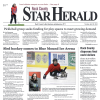
Question: I want to install a lift kit and put bigger tires on my Jeep. I want to comply with all the state laws. What is a bumper height law and the law about tires that extend out past the fenders?
Answer: Anytime you make any modification or alteration to a vehicle’s stock suspension and tires/rims, it can change how that vehicle handles, steers, brakes and could affect its overall performance.
Below is a list of equipment violations and safety issues that I have seen over the years with modified trucks:
•Bumper height violations: The law in Minnesota says bumper height must be within six inches of the factory bumper height. The maximum bumper height for 4x4s is 25 inches. Bumpers must be at least 4 1/2 inches tall and must extend 10 inches outside of each frame rail. The height of the bumper shall be determined by measuring from the bottom of the bumper, excluding any vertical bumper attachments, to the ground. A vehicle which has an original bumper that does not exceed a height of 30 inches may be modified by attaching a full width bumper to the regular bumper to meet the height requirement.
•Tires exceeding past the fenders: Installing wheels that extend outside the fenders require a fender flare. They must be at least as wide as the tires and must have a clearance of not more than nine inches from the ground when the vehicle is empty.
•Speeding due to larger tires/rims: The speedometer reads how many revolutions the tires are making, not how fast they are spinning. With larger tires the circumference of the tires are larger, meaning the distance around the tire is longer, so with each revolution you travel farther than before. Now, the actual speed of the vehicle is higher than the speedometer reads. It will be lower if smaller tires/rims are installed. I recommend stopping at a local auto/tire shop so they can advise on how much your speedometer would be off.
•Higher risk for a rollover crash: Increasing the vehicle’s height will increase the vehicle's center of gravity, making it less balanced. This could be a problem when taking sharp turns, as a higher center of gravity gives the vehicle a tendency to lean more, increasing the chances of rolling over or losing control. Additional modifications may be needed to correct this. Make sure to read the lift kit manufacturer’s instructions when installing it yourself or have it professionally installed.
•Braking, steering issues, reduced blind spots and overall safety of your vehicle: By adding larger tires and rims, the stock brake system may need to be upgraded. The front suspension may need bigger and stronger parts. Taller vehicles may increase your blind spots, as smaller vehicles may be less visible. Adding larger mirrors, relocating the current mirrors or adding a blind spot mirror to help see vehicles in blind spots might be necessary. It is highly recommended that you consult with a professional mechanic before modifying a vehicle to assure it is safe and complies with all state laws.
You can avoid a ticket — and a crash — if you simply buckle up, drive at safe speeds, pay attention and always drive sober. Help us drive Minnesota Toward Zero Deaths.
If you have any questions concerning traffic related laws or issues in Minnesota send your questions to Sgt. Troy Christianson – Minnesota State Patrol at 2900 48th Street NW, Rochester MN 55901-5848. (Or reach him at, Troy.Christianson@state.mn.us)



